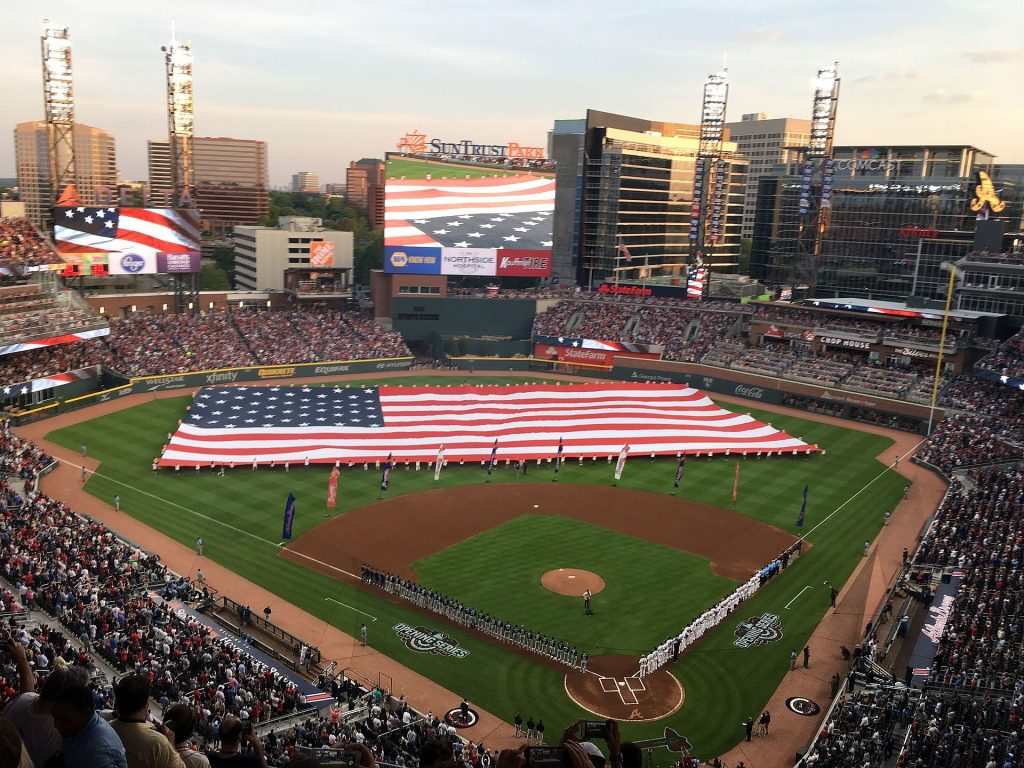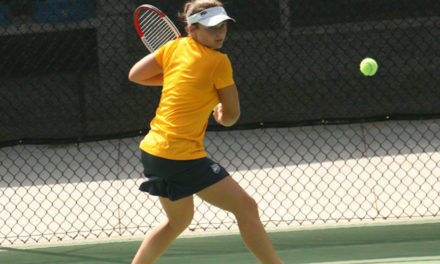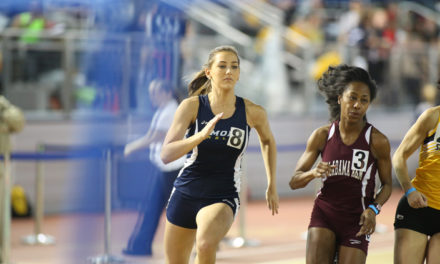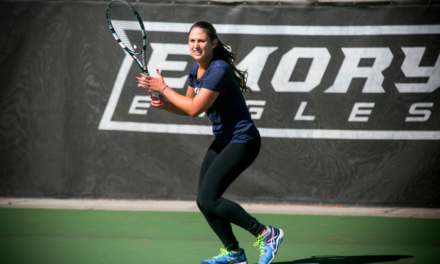It’s no secret that Atlanta sports, both professionally and on the collegiate level, have struggled when it matters most. For instance, the Atlanta Hawks have not made the NBA Finals in 59 years. Other Atlanta sports teams, too, have struggled in the postseason, the most recent tragedy coming from the Atlanta Braves. The Wheel selected unforgettable moments in Atlanta sports history that embody the city’s infamous streak of failure.
Braves Blow 3-1 Lead to Advance to World Series
After leading 3-1 in the series, needing only one more game to advance to the World Series, the Atlanta Braves let the Los Angeles Dodgers pry their way out of the clutches of defeat and secure their spot in the World Series this year against the Tampa Bay Rays. In this episode of Atlanta’s sports humiliation, the cause can be boiled down to several big-time plays by the Dodgers as well as several costly Braves errors.
Atlanta won the first two games of the series; however, this success did not carry over into Game 3, where Atlanta lost 15-3, with an MLB playoff record 11 runs scored in the first inning. Despite the blowout, the Braves responded in Game 4, winning 10-2; yet this would prove to be of no avail as the Dodgers won the next three games, burying all hopes that Atlanta fans had in the Braves bringing home a championship.
The final game of the series brought about as much excitement as one could hope for in a Game 7. The Braves went up 2-0 early on, but the Dodgers tied it up in the third inning. The Braves took the lead again, going up 3-2, and looked prime to add on to their lead until Braves first baseman Freddie Freeman was robbed of a home run by Dodgers right fielder Mookie Betts at the wall. Betts’ catch would change the momentum of the game, with the Dodgers scoring two home runs late in the game that ultimately clinched their victory over Atlanta. The Dodgers took home the win and punched their tickets to the World Series, winning 4-3.
The Braves have won a total of three World Series championships in the franchise’s history but have failed to achieve similar success in recent years. The Braves will have to wait until next year to get another chance at making the World Series.

Truist Park, home of the Atlanta Braves and formally known as SunTrust Park, on Opening Day for the MLB in 2017./Courtesy of Wikimedia Commons, Thechased
-Jack Hudson, Contributing Writer
Trae Young Over Luka Dončić in 2018 NBA Draft … Really?
It’s not often a “can’t miss” prospect, a “generational” talent, is available for your team. On NBA draft night in 2018, that player, point guard Luka Dončić, was available for the Atlanta Hawks with the third overall pick. As any reasonable executive would have done, the Hawks drafted Dončić. But, as not all executives would, the Hawks traded with the Dallas Mavericks on draft night, sending Dončić to Dallas for point guard Trae Young and a 2019 first-round draft pick.
Coming out of Europe, Dončić was seen as a franchise-altering player and future MVP candidate. At age 18, Doncic was the MVP of the EuroLeague, the second-best professional league in the world. Some dubbed him a Magic Johnson-Larry Bird hybrid.
Two years into the NBA, Dončić has exceeded expectations. He won Rookie of the Year in 2019, and in 2020he was named an All-Star and earned first-team All-NBA honors. He led the Mavericks to the playoffs, where he averaged 31 points, 10 rebounds and nine assists per game. His game-winner in Game 4 of the Mavericks’ first-round series against the Los Angeles Clippers is one of the iconic moments of the 2020 season and cemented his status as the future of the league.
Where was Young during that shot? At home, playing horse and watching the playoffs because his Hawks failed to qualify for the playoffs for the third straight year. Now, this is not to say Young is a bust. In fact, he’s anything but. The diminutive sharpshooting point guard has career averages of 24 points and nine assists, and he made the All-Star team in 2020. Young is also an overwhelming Atlanta fan favorite.
Dončić and Young will be mentioned together for the rest of their careers as people inevitably play revisionist history on the draft night trade. Yet, Dončić could have — perhaps should have — been a Hawk. The next 10 years of Hawks basketball is now shrouded by one question: “What if we kept Luka instead of Trae?”
-Tripp Burton, Contributing Writer
The Emotional Roller Coaster of Super Bowl LI
The Atlanta Falcons’ locker room following Super Bowl LI was described as a morgue, and the cause of death of all the corpses? Choking. Some people will attribute the Falcons loss to the finesse of former New England Patriots quarterback Tom Brady; yet much of the blame rests on the shoulders of the Falcons. For the first three quarters, the Falcons kept Brady at bay and were in a more than ample position to win their first Super Bowl in franchise history.
The beginning of the end occurred when the Falcons were up 28-3. They were facing a third-and-1 at their 36-yard line. Instead of running or punting, the Falcons called for a deep pass. The Patriots forced a fumble on the play and recovered the ball at the 25.
The Falcons next play could’ve started with a second-and-9 from the 21-yard line, and then the Falcons could have run the ball twice before kicking a field goal to win it all. However, that is not how it went down. Falcons offensive coordinator Kyle Shanahan called a pass play, which resulted in a 12-yard loss, a holding call and an eventual punt.
On top of these sloppy plays, the Falcons’ offense struggled to get into a groove and their defense was worn out. The Falcons ran 46 plays compared to the Patriots’ 93, and the Falcons were 1-for-8 on third downs throughout the game. This choke job, especially on a stage such as the Super Bowl, has left a poor taste in Falcons’ fans mouths
-Sofia Himmel, Contributing Writer
UGA Following Suit in the 2018 College Football Playoff
Choking in big sporting events is not only unique to professional sports teams in Atlanta. In the 2018 College Football Playoff National Championship game, the University of Georgia Bulldogs helped carry the unfortunate choking legacy of Atlanta sports. Georgia faced off against the University of Alabama Crimson Tide, one of their biggest rivals. While Georgia started up big, the Bulldogs blew a double-digit lead to the Crimson Tide and ended up losing 26-23.
Georgia got out to a large lead early, going up 13-0 by the end of the first half. At the start of the second half, Alabama head coach Nick Saban spontaneously benched quarterback Jalen Hurts for backup quarterback Tua Tagovailoa. The teams exchanged touchdowns in the third quarter, but Georgia still held on to the 10-point lead entering the last quarter.
In the fourth quarter, Alabama kicked a field goal and Tagovailoa completed a 7-yard touchdown pass to current Falcons wide receiver Calvin Ridley. Georgia did not answer any of these scores, and the score was tied at 20 at the end of the fourth quarter and the game went to overtime.
Georgia scored first in overtime with a 51-yard field goal by kicker Rodrigo Blankenship. If Alabama scored a touchdown on the following possession, the overtime rules of college football dictate that they would win the game. Alabama took control of the ball. The rest is history.
Tagovailoa completed a 41-yard pass to wide receiver DeVonta Smith who took it to the end zone for a touchdown, securing the title for Alabama. Not only was Georgia up two possessions at the start of the fourth quarter, but the Bulldogs were shut out by the Alabama defense and let an inexperienced backup quarterback come back to defeat them in overtime.
-Michael Mariam, Senior Staff Writer
The Falcons’ Disappointing 2012 NFC Championship Trip
The notorious 28-3 choke was not the first of the Atlanta Falcons’ postseason woes. In fact, by Super Bowl LI, they were already experienced playoff choke artists. In 2012, the 14-4 Falcons were facing off against the San Francisco 49ers.
The Falcons came in firing, with quarterback Matt Ryan capping off the first drive on a 43-yard touchdown bomb to their emerging stud wide receiver Julio Jones. The Ryan-Jones connection stayed hot, and the Falcons held a steady momentum. On the first play of the second quarter, Ryan connected with Jones again, this time on a 20-yard touchdown pass.
At the beginning of the second half, the Falcons led 24-14, but in typical Atlanta fashion, this lead didn’t last. In the third quarter, Atlanta’s offense stalled and Ryan had two costly turnovers. The 49ers took full advantage, scoring two touchdowns courtesy of their six-year veteran running back Frank Gore to take their first lead of the game.
With about four minutes on the clock and the score at 24-28, the Falcons badly needed a touchdown to regain the lead. Just in time, the offense seemed to be heating up again, and Ryan was driving on the 49ers defense. On third-and-2, he floated a beautiful pass to wide receiver Harry Douglas, who then tripped on the turf despite a clear path to the end zone. The play was still ruled a reception — much to the chagrin of 49ers’ head coach Jim Harbaugh. But, to Harbaugh’s undoubtable enjoyment, the Falcons’ drive stalled in the red zone and a fourth-down incompletion sealed the Falcons’ fate. When all was said and done, the game ended at 24-28 in favor of the 49ers. The Falcons had blown a 17-point lead, and gave way to the largest comeback ever in NFC Championship history.
-Ethan Mayblum, Contributing Writer
Jack Hudson (22C) is from Atlanta, Georgia, majoring in environmental science. He is a goalkeeper for the Emory men’s soccer team and a transfer from the University of Kentucky, where he also played soccer. Outside of class, Hudson enjoys volunteering at the Blue Heron Nature Preserve and skateboarding.






